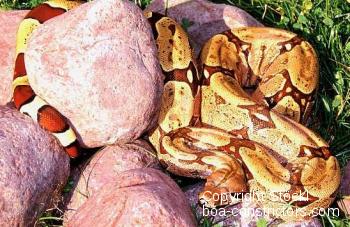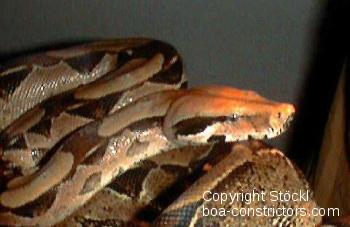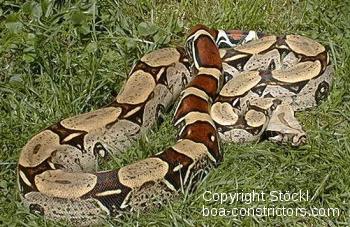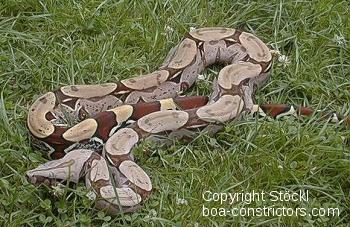- ! ! ! ! ! ! ! ! ! ! ! ! ! Latest Updates
- ! ! ! ! ! ! ! ! ! ! ! ! ! Latest Updates
- ! ! ! ! ! ! ! ! ! ! ! ! ! Latest Updates
- Home
- Boa constrictor subspecies
- Boa constrictor - Interesting Facts
- More boa information
- Boa Gallery
- Boas for Sale
- Contact
Boa constrictor constrictor
Common name of Boa c. constrictor ‘Red-tailed Boa’
Distribution area Bolivia, Brazil, Columbia, Ecuador, French Guyana, Guyana, Peru, Suriname, Trinidad and Tobago, Venezuela.
Estimated average length of mature female Boa c. constrictor Approximately 1.90 to 2.20 m (6.2 to 7.2 ft)
Taxonomic status Subspecies recognized by the CITES convention
| Brazil |
| Suriname |
| Guyana |
| Peru |
| Trinidad and Tobago |
| Venezuela |
| Columbia |
Boa constrictor constrictor | true Boa c. constrictor | true boa constrictor constrictor | purebred redtail boa | true redtail boa |Boa c. constrictor information | Boa c. constrictor size | Boa c. constrictor length | information on Boa c. constrictor
| Dorsal Scale Rows | Ventral shields | Caudal shields | Number of saddle patches | Extension of hemipenes as measured by subcaudals |
|---|---|---|---|---|
| 81 – 95 (BOULENGER, 1893) | 234 – 243 (BOULENGER, 1893) |
49 – 60 (BOULENGER, 1893) |
15-20 (BOULENGER, 1893) | 27 (PRICE & RUSSO, 1991) |
| 85 – 89 (STULL, 1932) | 234 – 250 (STULL, 1932) | 49-62 (STULL, 1932) | 20-21 (LANGHAMMER, 1983) | |
| 81 – 87 (LANGHAMMER, 1983) | 227 – 248 (LANCINI & KORNACKER, 1989) | 52-60 (LANCINI & KORNACKER, 1989) | 16-20 (LANCINI & KORNACKER, 1989) | |
| 91-95 (CHIPPAUX,1986) | ||||
| 75 – 91 (LANCINI & KORNACKER, 1989) |
Boa c. constrictor offspring for sale
Boa c. constrictor is the variety of Boa constrictor which provided the basis for the original description of this taxon, the so-called nominate form. A list of the countries in which Boa c. constrictor occurs already demonstrates the huge range of this subspecies. Consequently, it is by no means astonishing that this subspecies, like Boa c. imperator, has developed an enormous variability.
We may suppose that our terrariums only present a very small portion of the color and pattern variations of Boa c. constrictor existing in the wild. Considering the speed at which the destruction of the Amazonian rainforest proceeds, the possibility of making substantial new discoveries before it is too late are rather gloomy.
Thanks to its usually bright red tail coloration, Boa c. constrictor enjoys considerable popularity in captivity. The friends of this species have coined the term ‘red-tailed boas’ to name it. The bat-shaped saddle patches (which are called ‘widows’ peaks’) considerably contribute to the popularity of this subspecies.
One thing must be qualified, however, as Boa c. constrictor from certain parts of the distribution area do not have red but brown or even dark brown tails. The saddle patch pattern may vary as well. For example, Boa constrictors from Peru (and some animals from Suriname, too) may present saddle patches which are shaped like hourglasses.
The members of the nominate form most frequently kept in captivity originate from Suriname or from the Guyana states. Boa c. constrictor inhabiting these regions undoubtedly show the largest amount of red in their tails.
As far as that goes, it is not astonishing that the ‘Suriname’ and ‘Guyana redtails’ enjoy some kind of cult status among boa keepers.
In captivity boas remain smaller as in the wild. A redtail boa of 10 feet in length is a rarity in captivity (Average size of the females is about 7 ft. in length).
The most important signs of Boa c. constrictor are the bat-shaped, brown to dark-brown middorsal blotches ("widows-peaks"), yet we saw also hour-glass shaped saddles on wildcaught Surinam redtails from the region around the village of Pokigron.







